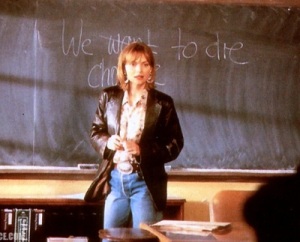Compared to the number of television series about lawyers, doctors, and policemen, there seems to be precious few shows about teachers and teaching. Granted, there have always been plenty of shows about teenagers and college-aged people. But those shows, obviously, are not about their education. In these shows, school is often completely irrelevant in the lives of the main characters. It is only an annoying obligation to fulfill and often an obstacle to overcome. Or school might serve as a neutral backdrop, providing, perhaps, a reason for the heros and heroines to interact with each other. Sometimes, it dramatizes the conflict and acts as the source of the social pressure that these youngsters must face (I’m thinking of the Clueless TV series and Fox’s new show, Glee). If we are lucky, we might get an interesting and sympathetic teacher or two, but most of the educators in these shows tend to be clueless or idiotic. As much as we may learn about the main characters’ dating and family lives, the audience usually learns very little about their intellectual lives.

The cast of Boston Public
The notable exception is Boston Public, a show that ran from 2000 to 2004 on Fox. Boston Public is explicitly focused on the lives of teachers, administrators, and students in a public school in Boston. I remember watching a few episodes at that time. As with many shows created by David E. Kelley, it featured plenty of intense, melodramatic situations and strange plot turns. There are some serious issues presented by the stories: teen pregnancies, poverty, and affirmative action were the ones that I remember. But the presentation of the issues often felt stilted and simplistic. Let’s just say that it was no West Wing.
I can, however, think of many movies off the top of my head about teachers and students. Dead Poet’s Society, Mona Lisa Smile, Dangerous Minds…

Robin Williams in Dead Poets Society
These movies are strikingly similar in plot and tone — the teacher is a Christ-like figure that prods and pleads, instructs and inspires. It takes much hard work, conflict, drama, tears, and swelling music. The way he breaks through to the student is often with poetry and art. In any event, with the power and the beauty of words, he or she eventually transforms the students from despairing or apathetic creatures into brave, introspective souls ready to actualize their true selves.
These movies are usually one-man shows. The teacher is the lone hero. He or she receives no help or support from the school he works for. In fact, the school is often the enemy, marginalizing the teacher, undermining his efforts, and driving him away. Of course, the teacher triumphs even in defeat, because his success lies in lifting and liberating the minds and souls of his students.
This kind of standard plot about education is perhaps the reason why we see it much more in movies than on TV. Lifting minds and souls (with Shakespeare, no less) is heady stuff once in a while but is rather tedious to watch every week (not to mention unrealistic — I have taught poetry to inner-city children, and… well, let’s just say that I was no Robin Williams). More perniciously, could this type of cultural cliche also create unrealistic expectations for our real schools and our real teachers, much as watching too much soppy chick flicks might poison one’s sense of what a realistic relationship ought to be?

Michelle Pfeiffer in Dangerous Minds
I wonder why there is not as much interest in the technical aspects of education as there is in the technical aspects of the legal and medial prefession, in the way the system works rather than character studies of a few noteworthy personalities. Law and Order, for example, is engrossing not only because of the compelling characters, but because it exposes the inner workings of the legal world and shows how the police and the attorneys strategize, make decisions, and stumble. In short, it shows how the system (or at least a dramatized, simplified version of the system) works. Same thing with medical shows such as ER or Grey’s Anatomy.
Could a show about the education system, how a school is run, what teachers and administrators worry about, how they react to sudden problems, how they make decisions, how they interact with each other, and the tension, the conflicts, the politics, and the friendship among them, could such a show make good television? I bet it would.
Filed under: pop culture | Tagged: Boston Public, cultural cliches, TV shows | 4 Comments »

